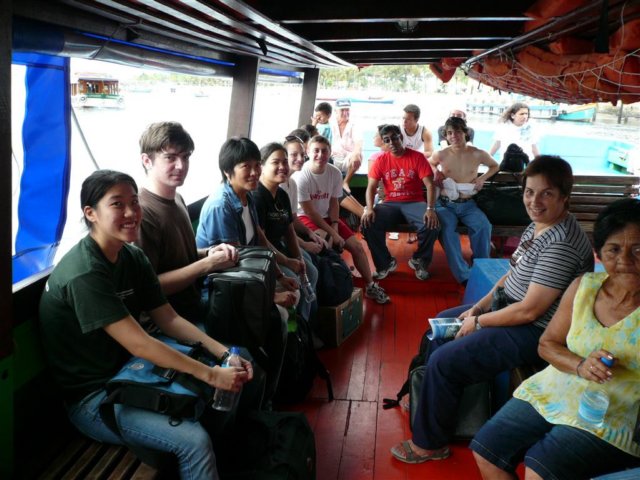Students at the University of Maryland, College Park, in cooperation with the community of Ilha das Peças, coordinated a project with EWB-USA. After surveying the exiting conditions on the island, in January 2006 a team of students and professionals traveled to the village to discuss the community’s needs with its citizens and collect data on water supply and sanitation. The community identified the water shortage as a severe problem. Additional survey information identified wastewater run-off as another critical concern.
Accomplishments

Phase I: August, 2006: In August of 2006 the team implemented the two systems designed to supply the village with an adequate water supply and mitigate the community’s problems with waste water con-tamination.In order to give the population a greater elasticity in their water supply, we constructed a water tank in the village. The tank supplements the current system by storing water during periods of low demand and then dispensing the water during periods of high demand. Additionally, a chlorination system was installed to ensure that the water supply is safe to use and drink.
Phase II: January, 2007: In January of 2007, the Brazil team completed the construction of four greese traps, septic tanks, and constructed wetlands (CWT) to treat wastewater from four separate buildings in the village, in order to prevent further contamination of the streams surrounding the village and to help improve the water quality. Each system was sized for the according number of people occupying each building, and were built with slightly different designs, in hopes of finding the best and easiest design for the community to reproduce using their own materials for the other buildings in the village.
Further Expansion
During an assessment trip in August 2010 a team consisting of two undergraduate students, a logistics mentor, a professional mentor, and a faculty advisor focused its efforts on gathering samples and performing tests from water around the school. Several meetings with the teachers at the school occurred to ensure their collaboration and understanding of the project. A general meeting with the community was also organized to communicate EWB-UMCP’s intentions for the potable water project at the school and to hear the input from the community as well. Meetings with the local government leaders were also organized where the needs of the community were discussed and the potable water project for the school at the island was proposed.
The design phase took place during the Fall semester of 2010 and the Spring semester of 2011. The team designed a rain water catchment system which included a cartridge filter system for pre-filtration and an ultraviolet disinfection system as the final purification step. The rain collected was directed to an existing large tank and mixed with the municipal water, which later was directed to the filtration system. In addition, a shallow well was designed to meet the non-potable water demands at the local school. A physical separation of the potable and non-potable piping was also designed.
In August of 2011, a team consisting of one faculty mentor, one professional mentor and 6 undergraduate students traveled to the island to implement the designed project. The entire system was successfully implemented. The local school at Ilha das Peças now has a constant supply of both potable water and non-potable water.
In March of 2014, EWB-UMCP traveled on a final monitoring/evaluation trip to Ilha das Pecas, Brazil. On this trip we collaborated with in-country contacts from local universities to examine the previously implemented projects. Additionally, we were able to work with the community to develop and plan sustainable solutions for problems they have encountered since the last projects were implemented.
From this trip we gained valuable insight into how the projects have fared, how they were embraced by the community, why they were successful, and, in some instances, why they were unsuccessful. We can now apply this information to current and future projects in other countries to ensure their continued success.
